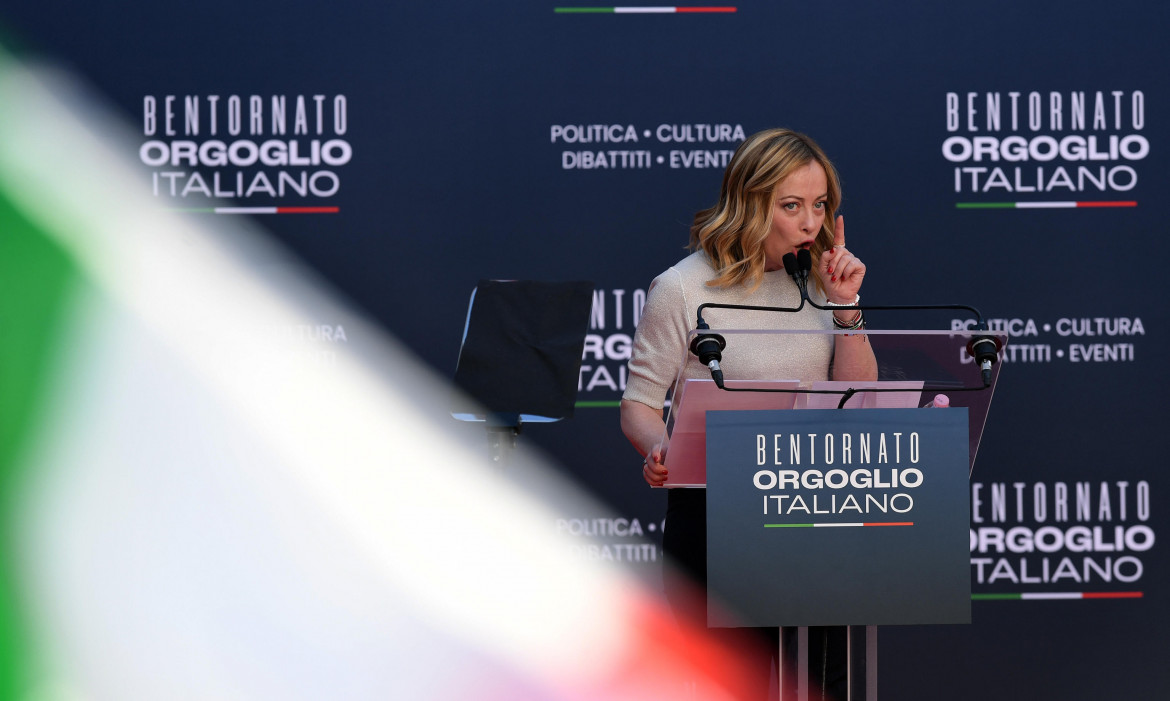Commentary
Meloni covers for the neo-fascists discovered in her party’s ranks
Fanpage's investigation uncovered a real gathering of neo-fascists. The Prime Minister knows this and is defending them.

Giorgia Meloni's letter in response to the Fanpage investigation’s revelations about the neo-fascism lurking among the FdI’s youth organization is a confirmation that her party is still defending the values of the MSI – the “fascists in democracy,” to quote the oxymoronic description originating from their founder and political guiding light, Giorgio Almirante, murderer of partisans and editor of Defense of the Race, the magazine that paved the way for Mussolini's anti-Semitic racial laws and the Nazi death camps. In short, she is defending the values inherited from the Salò “Republic.”
To be sure, Meloni is downplaying what the investigation found, complaining that the compromising statements are part of a “caricature-like script useful only for the narrative that our opponents want to construct about us.” Are we really supposed to believe that? It wasn’t extras from Cinecittà who were shouting “Duce, duce, duce!” and “Sieg heil!” in the recordings we have seen in recent days. Nor were they just “soccer fans of Casertana,” as Gasparri suggested, clearly at the end of his rope.
Fanpage's investigation uncovered a real gathering of neo-fascists. The Prime Minister knows this and is only writing to indirectly hint to the “Dear leaders of Fratelli d'Italia” that they should use the same precautions that the investigation revealed and that the participants themselves repeated over and over: “You can't take photos or videos inside”; “Take care guys, no Roman salutes”; “Let's be careful, there are journalists.” And one could even add the exhortation to “start an active fight against shitty journalism” as Flaminia Pace said.
Her message is also aimed at us, the pro-democratic Europeans: it was all nothing but some “dumb folklore.” To make us believe this reassuring fable, she quotes her party’s support for the 2019 European Parliament resolution for the condemnation of “the dictatorships of the 20th century.” However, she leaves out inconvenient details. The resolution in question does not generically condemn all evil in the world, but urges member states to “counter organizations that spread hate speech and violence in public spaces and online, and to impose an effective ban on neo-fascist and neo-Nazi groups and any other foundations or associations that exalt and glorify Nazism and fascism.” This clearly includes those sinister demonstrations being organized in Hungary, under Meloni’s friend Orban – the same demonstrations that our Ilaria Salis went to protest.
Meloni claims that “the right-wing parties many of us come from already came to terms with the past and with the 20 years of Fascism several decades ago.” That may be the case, but the resolution says something else entirely: we need to come to terms with contemporary neo-fascism (from the Piazza Fontana bombing to the assault on the CGIL), not just the march on Rome in 1922.
Furthermore, the 2019 resolution calls for celebrating May 25 and August 23 as days against totalitarianism and in memory of the victims. These dates are not celebrated in our country; fortunately, it does celebrate the Constitution, which had the communist Umberto Terracini among its signatories.
Meanwhile, the right honorable La Russa is the author of a law establishing another day of “remembrance”: not of the victims of fascist totalitarianism (whom we do not commemorate at all – one wonders why), but the four thousand Italian dead in Yugoslavia. They were certainly victims, but of the same nationality as the army that had invaded Yugoslavia together with Germany, causing more than a million deaths. And this brings us to the usual self-victimization of the far right.
Giorgia Meloni seems to forget that she has been in government for 20 months, together with two other parties that have been in power for many years and have governed as much as anyone else. Her coalition controls at least four newspapers and an important part of RAI, in addition to owning Mediaset.
And yet, Meloni keeps complaining that the poor right is the victim of “attacks of all kinds, without rules, without limits, no holds barred.” “It is a hard game, a difficult battle, for which one must be willing to make many sacrifices,” she writes.
The bad guys are everyone else, of course, while Giorgia's young people, “with a clear conscience, are defending Freedom in schools and universities from the violence and arrogance of the left,” and fighting against “the narrative created by big media and partisan observers.”
In her telling, it’s all a fight against “the European and Western social-democratic swamp” (the demoplutocracy?), and against the “games of power, the lobbies, the privileges of the few on the backs of the many.”
Perhaps some people fall for this rhetoric, or want to believe it. But why? Are four lines from Meloni’s press office enough to cancel out years of journalistic investigations, of which the Fanpage one is only the latest?
Giorgia Meloni's flimsy letter is not only a smokescreen for Italians and Europeans. It is also a message to her own: “We are a wrinkle in history,” she repeats proudly.
Her people have heard this pompous phrase many times. It can be found in the video that her propaganda office has been spreading on social media for years. Young right-wingers remember well that this slogan comes from when she was defending the party’s flame logo: the symbol that the “fascists in democracy” (and their French cousins) have been bandying about with pride since the end of World War II.
Her message is: don't worry, I only have to write these four lines because we got caught with our hand in the cookie jar again. Need more proof? Look through her text: you won’t find any mention of anti-fascism.
Originally published at https://ilmanifesto.it/la-capricciosa-menzogna-di-scrivere-a-se-stessa on 2024-07-04
